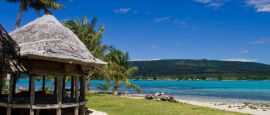Samoa History, Language and Culture
History of Samoa
The Samoan islands had been inhabited for almost 3,000 years before their first contact with Europeans early in the 18th century. It wasn’t until the 1830s that regular visits saw British missionaries and traders arrive and duly convert many islanders to Christianity.
In their wake, it was the Germans and Americans who vied to take control with Britain sending troops to protect its interests. Between them the three colonial powers supported an eight-year civil war and direct confrontation was only avoided by a massive storm that damaged or destroyed their warships in Apia Harbour.
Following a second civil war, Britain and the USA settled their differences and the island group was divided between Germany and the USA. Contemporary Samoa comprises those islands colonised by the Germans, who declared a protectorate over them in 1899. During WWI, the Germans were driven out by New Zealand.
Measures towards autonomy were introduced in the 1950s, before Samoa became the first Pacific island to gain independence in 1962 as Western Samoa, the name it kept until 1997. The period of rule from Auckland, typified by racism, neglect and brutality, carries bitter memories for the Samoans and in 2002, New Zealand premier Helen Clark formally apologised to the Samoan people for their maltreatment during that time.
Political parties in the normal sense did not feature in Samoan politics until the late 1970s when a group of Fono (national assembly) members in opposition to the government created the Human Rights Protection Party (HRPP) which has dominated Samoan politics ever since.
In 1997 Western Samoa changed its name to Samoa. A year later, Prime Minister Tuilaepa Sailele Malielegaoi was heavily criticised for changing the side of the road that Samoans drive on from right to left. The switch led to the biggest protest in Samoan history and the foundation of the People’s Party.
The Samoans are very active in the democratic process and since the introduction of universal suffrage in 1991 turn out for elections has averaged around 90%.
Did you know?
• Tuilaepa became the first elected leader to represent his country at a multi-sport event when he took part in target archery at the 2007 South Pacific Games.
• Robert Louis Stevenson lived on Samoa from 1889 until his death in 1894.
• Samoa has no regular armed forces but can call on those of New Zealand under the terms of the 1962 Treaty of Friendship.




 You know where
You know where